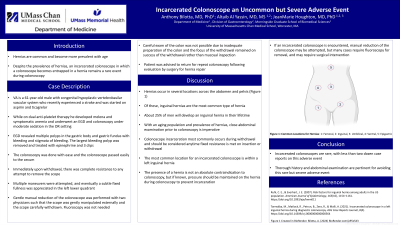Sunday Poster Session
Category: General Endoscopy
P0692 - Incarcerated Colonoscope: An Uncommon but Severe Adverse Event
Sunday, October 27, 2024
3:30 PM - 7:00 PM ET
Location: Exhibit Hall E

Has Audio
- AB
Anthony James Bilotta, II, MD, PhD
University of Massachusetts Chan Medical School
Worcester, MA
Presenting Author(s)
Anthony James. Bilotta, MD, PhD, Altaib Al Yassin, MD, DO, MS, Jean Marie Houghton, MD, PhD
University of Massachusetts Chan Medical School, Worcester, MA
Introduction: An incarcerated colonoscope is a rare event during colonoscopy. With an aging population at increased risk of hernia development, the frequency of incarcerated colonoscopes will likely increase. This makes it an important scenario for gastroenterologists to be aware of.
Case Description/Methods: A 61-year-old male with past medical history of congenital hypoplastic vertebrobasilar system and hypertension presented for colonoscopy after developing melena with initiation of dual anti-platelet therapy. He was under monitored anesthesia care and the colonoscope was passed to the cecum without difficulty. However, the colonoscope could not be withdrawn from the cecum despite attempts of reducing a presumed loop. Subsequent evaluation noted that the colonoscope was incarcerated within a left inguinal hernia. Through manual reduction of the hernia, the colonoscope was able to be withdrawn. After the procedure, the patient was recommended to undergo surgical evaluation with hernia repair prior to any future colonoscopy.
Discussion: There are many well-known complications with colonoscopy; however, incarcerated colonoscopes remain rare. In this case report, we present a patient who presented for a colonoscopy who experienced an incarcerated colonoscope secondary to a previously unknown left inguinal hernia.
Hernias are common in the general population. There are three types of hernias: abdominal, inguinal, and femoral, with inguinal hernias being the most common. Many risk factors exist for hernias including male sex, low income, increased intra-abdominal pressure, and age >40 years old. With age being a risk factor for hernia development, there is a likelihood that the rate of incarcerated colonoscopes increases given the aging population in the United States. Many patients have not had prior abdominal imaging, making careful and thorough abdominal examination prior to colonoscopy imperative.
Despite the prevalence of hernias, incarcerated colonoscopes remain a rare adverse event with less than two dozen case reports on the topic. An incarcerated colonoscope should be considered anytime there is fixed resistance to insertion or withdrawal of the colonoscope. In our case, we encountered difficulty during colonoscope withdrawal, which was able to be overcome with manual hernia reduction, which may be aided by fluoroscopy. In extreme cases, laparoscopic removal and repair is warranted. Regardless of the outcome, all patients should undergo surgical evaluation and hernia repair prior to repeat colonoscopy.
Disclosures:
Anthony James. Bilotta, MD, PhD, Altaib Al Yassin, MD, DO, MS, Jean Marie Houghton, MD, PhD. P0692 - Incarcerated Colonoscope: An Uncommon but Severe Adverse Event, ACG 2024 Annual Scientific Meeting Abstracts. Philadelphia, PA: American College of Gastroenterology.
University of Massachusetts Chan Medical School, Worcester, MA
Introduction: An incarcerated colonoscope is a rare event during colonoscopy. With an aging population at increased risk of hernia development, the frequency of incarcerated colonoscopes will likely increase. This makes it an important scenario for gastroenterologists to be aware of.
Case Description/Methods: A 61-year-old male with past medical history of congenital hypoplastic vertebrobasilar system and hypertension presented for colonoscopy after developing melena with initiation of dual anti-platelet therapy. He was under monitored anesthesia care and the colonoscope was passed to the cecum without difficulty. However, the colonoscope could not be withdrawn from the cecum despite attempts of reducing a presumed loop. Subsequent evaluation noted that the colonoscope was incarcerated within a left inguinal hernia. Through manual reduction of the hernia, the colonoscope was able to be withdrawn. After the procedure, the patient was recommended to undergo surgical evaluation with hernia repair prior to any future colonoscopy.
Discussion: There are many well-known complications with colonoscopy; however, incarcerated colonoscopes remain rare. In this case report, we present a patient who presented for a colonoscopy who experienced an incarcerated colonoscope secondary to a previously unknown left inguinal hernia.
Hernias are common in the general population. There are three types of hernias: abdominal, inguinal, and femoral, with inguinal hernias being the most common. Many risk factors exist for hernias including male sex, low income, increased intra-abdominal pressure, and age >40 years old. With age being a risk factor for hernia development, there is a likelihood that the rate of incarcerated colonoscopes increases given the aging population in the United States. Many patients have not had prior abdominal imaging, making careful and thorough abdominal examination prior to colonoscopy imperative.
Despite the prevalence of hernias, incarcerated colonoscopes remain a rare adverse event with less than two dozen case reports on the topic. An incarcerated colonoscope should be considered anytime there is fixed resistance to insertion or withdrawal of the colonoscope. In our case, we encountered difficulty during colonoscope withdrawal, which was able to be overcome with manual hernia reduction, which may be aided by fluoroscopy. In extreme cases, laparoscopic removal and repair is warranted. Regardless of the outcome, all patients should undergo surgical evaluation and hernia repair prior to repeat colonoscopy.
Disclosures:
Anthony Bilotta indicated no relevant financial relationships.
Altaib Al Yassin indicated no relevant financial relationships.
Jean Marie Houghton indicated no relevant financial relationships.
Anthony James. Bilotta, MD, PhD, Altaib Al Yassin, MD, DO, MS, Jean Marie Houghton, MD, PhD. P0692 - Incarcerated Colonoscope: An Uncommon but Severe Adverse Event, ACG 2024 Annual Scientific Meeting Abstracts. Philadelphia, PA: American College of Gastroenterology.
